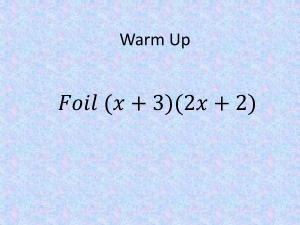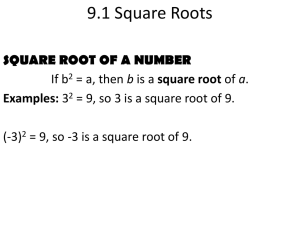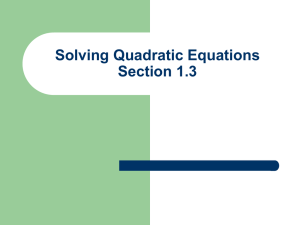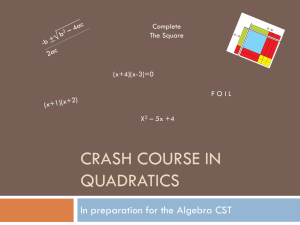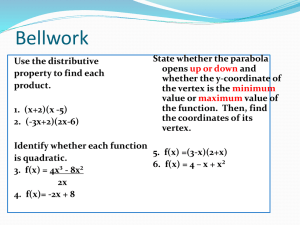Chapter 1
advertisement
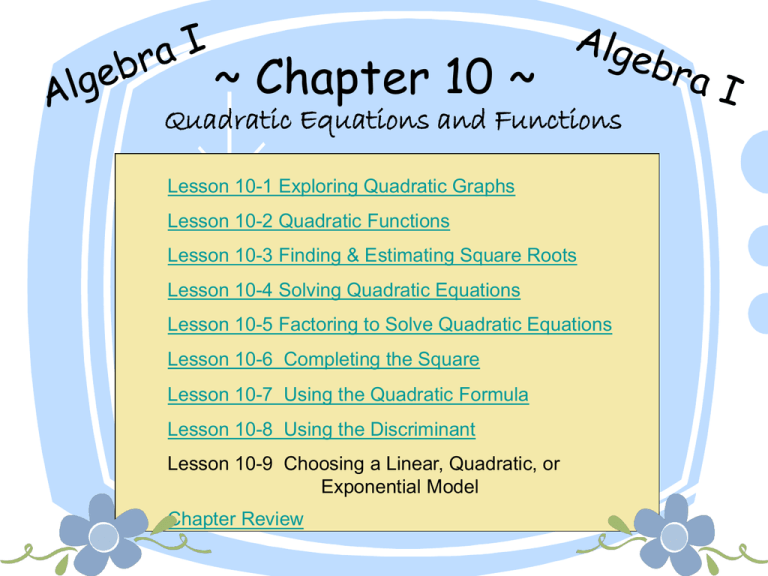
~ Chapter 10 ~ Quadratic Equations and Functions Lesson 10-1 Exploring Quadratic Graphs Lesson 10-2 Quadratic Functions Lesson 10-3 Finding & Estimating Square Roots Lesson 10-4 Solving Quadratic Equations Lesson 10-5 Factoring to Solve Quadratic Equations Lesson 10-6 Completing the Square Lesson 10-7 Using the Quadratic Formula Lesson 10-8 Using the Discriminant Lesson 10-9 Choosing a Linear, Quadratic, or Exponential Model Chapter Review Exploring Quadratic Graphs Cumulative Review Chap 1-9 Exploring Quadratic Graphs Notes Quadratic Function – a function in the form ax2 + bx + c, where a ≠ 0. Examples ~ y = 2x2, y = x2 -7, y = x2 – x – 3 The graph of a quadratic function is a parabola… The graph of y = x2 is ~> ~> ~> A parabola can be folded so that the two sides match exactly. The line that divides the parabola into two matched sides is called the axis of symmetry. The highest or lowest point of a parabola is called its vertex. If a > 0 in y = ax2 + bx + c ~> The parabola opens upward ~> The vertex is the minimum point If a < 0 in y = ax2 + bx + c ~> The parabola opens downward ~> The vertex is the maximum point The vertex is identified as an ordered pair and as minimum or maximum… Exploring Quadratic Graphs Notes Identify the vertex of each graph and tell whether it is a minimum or a maximum. Graphing y = ax2 (1) Make a table of values. (2) Graph the points. (3) Find the corresponding points on the other side of the axis of symmetry. Graph f(x) = -2x2 The value of a affects the width of the parabola as well as the direction it opens. You can order quadratic functions by their widths. Order y = x2, y = ½x2, and y = -2x2 from widest to narrowest… Graphing y = ax2 + c The value of c translates the vertex of the graph up (+) or down (-). Exploring Quadratic Graphs Notes Graph y = 2x2 + 3 Graph y = -1/2x2 – 4 In summary… (1) The coefficient of x2, a, determines the width and whether the parabola points upward (+) or downward (-). (2) The constant, c, determines the vertex location above or below 0. (3) Ordering quadratic graphs by width, the smaller the coefficient, a, of x2, the wider the graph. Exploring Quadratic Graphs Homework Homework – Practice 10-1 #1-26 Quadratic Functions Practice 10-1 Quadratic Functions Practice 10-1 Quadratic Functions Practice 10-1 Quadratic Functions Notes Graphing y = ax2 + bx + c y = 2x2 + 2x (1) Find the axis of symmetry… x = -b/2a Then find the y coordinate. These are the coordinates of the vertex. (2) Find two other points on the graph. (3) Reflect those two points over the axis of symmetry. Draw the parabola. Graph 2x2 + 2x Graph f(x) = x2 – 6x + 9 Graphing Quadratic Inequalities y ≤ x2 + 2x – 5 Graph the boundary curve… Shade the area below the curve because it is less than or equal to. Quadratic Functions Notes Graph y > x2 + x + 1 Quadratic Functions Homework Homework ~ Practice 10-2 even Finding & Estimating Square Roots Practice 10-2 Finding & Estimating Square Roots Practice 10-2 Finding & Estimating Square Roots Practice 10-2 Finding & Estimating Square Roots Practice 10-2 Finding & Estimating Square Roots Notes Finding Square Roots Every positive number has two square roots… The square root of 16 = 4 and -4 or ± 4. √25 means the positive or principal square root of 25 which is 5. -√25 means the negative square root of 25 which is -5. You can use ± to represent both square roots. Simplifying Square Root Expressions √64 = -√100 = ±√49 = √1/25 = - √121 = Rational & Irrational Square Roots Rational square roots have a terminating or repeating decimal… Irrational square roots have decimals that do not repeat. ±√81 = √8 = -√225 = √75 = ±√1/4 = Estimating Square Roots You can estimate square roots by using perfect squares. Estimation places the square root between two consecutive integers. Finding & Estimating Square Roots Example - √18.5 Notes √16 < √18.5 < √25 so… 4 < √18.5 < 5 so √18.5 is between 4 and 5. Your turn -√105 is between what two consecutive integers? Approximating Square Roots with a Calculator Find √18.5 to the nearest hundredth… Find √17.81 to the nearest hundredth Find -√203 to the nearest hundredth Finding & Estimating Square Roots Homework Homework – Practice 10-3 odd Solving Quadratic Equations Practice 10-3 Solving Quadratic Equations Notes Solving Quadratic Equations by Graphing A quadratic equation is an equation that can be written in the form… ax2 + bx+ c = 0, where a ≠ 0. This is the standard form of a quadratic equation. Quadratic equations can have two, one, or no real-number solutions. Algebra I focusing only on real-number solutions. Solve by graphing… x2 – 4 What about (The solution(s) are the x-intercepts) x2 = 0 ? x2 – 1 = 0 2x2 + 4 = 0 x2 – 16 = -16 Solving Quadratic Equations Using Square Roots To solve an equation in the form x2 = a; find the square roots of both sides. Solving Quadratic Equations Notes t2 – 25 = 0 t2 = 25 t=±5 Find the solution(s) 3n2 + 12 = 12 Try… 2g2 + 32 = 0 Factoring can also be used to solve the quadratic equation… x2 - 9 = 0 (x + 3) (x – 3) = 0 (x + 3) = 0 x = -3 or (x – 3) = 0 x=3 Solutions ±3 Solving Quadratic Equations Homework Homework – Practice 10-4 odd Factoring to Solve Quadratic Equations Practice 10-4 ~ Chapter 10 ~ Chapter Review Chapter 10 Review Part 1 Chapter Review Chapter 10 Review Part 1 Chapter Review Chapter 10 Review Part 1 Chapter Review Factoring to Solve Quadratic Equations Notes Using the Zero-Product Property If ab = 0, then a = 0 or b = 0 Solve (x + 7) (x – 4) = 0 So… x + 7 = 0 or x – 4 = 0 x = -7 or x=4 Your turn… Solve (3y – 5) (y – 2) = 0 Solving by Factoring x2 – 8 x – 48 = 0 (x – 12) (x + 4) = 0 x – 12 = 0 or x = 12 or x+4=0 x = -4 Your turn… x2 + x – 12 = 0 x = -4 or x = 3 Factoring to Solve Quadratic Equations Notes 2x2 – 5x = 88 2x2 – 5x – 88 = 0 Your turn… Solve x2 – 12x = -36 x2 – 12x + 36 = 0 (x - 6)2 = 0 x=6 Factoring to Solve Quadratic Equations Homework ~ Homework ~ Practice 10-5 even Completing the Square Practice 10-5 Using the Quadratic Formula Notes Using the Quadratic Formula If ax2 + bx + c = 0, and a ≠ 0, then… x = -b ± b2 – 4ac 2a Make sure your quadratic equation is in standard form… Solve x2 + 6 = 5x x2 – 5x + 6 = 0 x = - (-5) ± x=5± (-5)2 – 4(1)(6) 2(1) 25 – 24 2 x = 5 ± √ 1 = 5 + 1 or 5 – 1 2 2 2 = 6 2 or 4 2 = 3 or 2 Using the Quadratic Formula Notes Your turn… Solve using the quadratic formula x2 – 4x = 117 x2 – 2x – 8 = 0 Finding Approximate Solutions 2x2 + 4x – 7 = 0 x = - (4) ± (4)2 – 4(2)(-7) 2(2) = -4 ± 16 – (-56) 4 x = -4 + √72 or -4 - √72 ≈ -4 + 8.49 or -4 - 8.49 ≈ 1.12 or -3.12 4 4 4 4 Your turn… 7x2 – 2x – 8 = 0 Using the Quadratic Formula Homework Homework – Practice 10-7 even Using the Discriminant Practice 10-7 Using the Discriminant Notes Number of Real Solutions of a Quadratic Equation Discriminant – The expression under the radical in the quadratic formula. (b2 – 4ac) The discriminant can be used to determine how many solutions a quadratic equation has before you solve it… If b2 – 4ac > 0, there are 2 solutions If b2 – 4ac = 0, there is 1 solution If b2 – 4ac < 0, there are no solutions Using the Discriminant Find the number of solutions for x2 – 2x – 3 b2 – 4ac = (-2)2 – 4(1)(-3) 4 – (-12) = 4 + 12 = 16 > 0 , so there are 2 solutions. Your turn… Find the number of solutions for 3x2 – 4x – 7 Find the number of solutions for 5x2 + 8 = 2x Using the Discriminant Homework Homework – Practice 10-8 odd & Chapter 10 Review Part 2 Using the Discriminant Homework ~ Chapter 10 ~ Chapter Review ~ Chapter 10 ~ Chapter Review


